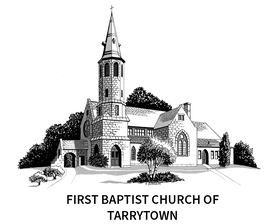Why is FBC Tarrytown a Baptist church?
While the name Baptist carries both positive and negative connotations to people, the historical term is still meaningful today.
Baptists of all backgrounds believe in the biblical doctrines alongside many other denominations and movements of Christianity.
Five distinctives set Baptists apart.
1. Democracy of the Local Church
Also referred to as the Autonomy of the Local Church, Baptists believe that God speaks to and through the local congregation. While we can freely choose to participate in other like-minded congregations (we are a part of the Venture Church Network), the local congregation is free from external control. It is up to us to discern how we are to be governed and what God is calling our church to do. (See the practices in Acts 6:1-6)
2. Universal Priesthood
Just as the priests in the Old Testament would bring people to God, we believe all believers have been authorized and empowered to introduce our neighbors to the Lord Jesus Christ. Along with this, we believe Christians do not need an intermediary to go before God. Because of Jesus, all followers of Christ have direct access to God and can go to him at any time. (1 Peter 2:9)
3. Believer’s Baptism by Immersion
Baptism identifies us with Christ. It is a physical and spiritual declaration of obedience to Christ. We Baptize by full-body immersion because this best symbolizes the death, burial, and resurrection of Christ. As the Apostle Paul said, “I have been crucified with Christ. It is no longer I who live, but Christ who lives in me. And the life I now live in the flesh I live by faith in the Son of God, who loved me and gave himself for me” (Galatians 2:20)
4. Communion / The Lord’s Supper
We also practice Communion or The Lord’s Supper as a reminder and declaration that the shed blood of Jesus has forgiven our sins. (1 Corinthians 11:23-26)
4. The Authority of the Bible
Along with many other believers throughout the centuries and to the present day we also believe that the Bible is the authority for faith and practice. (2 Timothy 3:16-17)
Names are important. They carry definitions and boundary markers that help us communicate.
The vast majority of non-denominational churches in America are actually Baptist in belief and practice. I understand the impulse to distance a local church from the name Baptist. Not everyone has positive connotations for the title. But the enduring focus of our distinctive speaks to the power of our distinctive, and how many believers recognize our distinctive as biblical truths and practices.
I don’t know how long the term Baptist will endure. Maybe it will fade into history. Or it could endure until Jesus comes back. But for now, it is a helpful shorthand that communicates that God speaks through this local congregation, that all believers have direct access to God, that we declare Jesus through baptism by immersion and communion, and that we believe God communicates through the Bible.
While the name Baptist carries both positive and negative connotations to people, the historical term is still meaningful today.
Baptists of all backgrounds believe in the biblical doctrines alongside many other denominations and movements of Christianity.
Five distinctives set Baptists apart.
1. Democracy of the Local Church
Also referred to as the Autonomy of the Local Church, Baptists believe that God speaks to and through the local congregation. While we can freely choose to participate in other like-minded congregations (we are a part of the Venture Church Network), the local congregation is free from external control. It is up to us to discern how we are to be governed and what God is calling our church to do. (See the practices in Acts 6:1-6)
2. Universal Priesthood
Just as the priests in the Old Testament would bring people to God, we believe all believers have been authorized and empowered to introduce our neighbors to the Lord Jesus Christ. Along with this, we believe Christians do not need an intermediary to go before God. Because of Jesus, all followers of Christ have direct access to God and can go to him at any time. (1 Peter 2:9)
3. Believer’s Baptism by Immersion
Baptism identifies us with Christ. It is a physical and spiritual declaration of obedience to Christ. We Baptize by full-body immersion because this best symbolizes the death, burial, and resurrection of Christ. As the Apostle Paul said, “I have been crucified with Christ. It is no longer I who live, but Christ who lives in me. And the life I now live in the flesh I live by faith in the Son of God, who loved me and gave himself for me” (Galatians 2:20)
4. Communion / The Lord’s Supper
We also practice Communion or The Lord’s Supper as a reminder and declaration that the shed blood of Jesus has forgiven our sins. (1 Corinthians 11:23-26)
4. The Authority of the Bible
Along with many other believers throughout the centuries and to the present day we also believe that the Bible is the authority for faith and practice. (2 Timothy 3:16-17)
Names are important. They carry definitions and boundary markers that help us communicate.
The vast majority of non-denominational churches in America are actually Baptist in belief and practice. I understand the impulse to distance a local church from the name Baptist. Not everyone has positive connotations for the title. But the enduring focus of our distinctive speaks to the power of our distinctive, and how many believers recognize our distinctive as biblical truths and practices.
I don’t know how long the term Baptist will endure. Maybe it will fade into history. Or it could endure until Jesus comes back. But for now, it is a helpful shorthand that communicates that God speaks through this local congregation, that all believers have direct access to God, that we declare Jesus through baptism by immersion and communion, and that we believe God communicates through the Bible.

